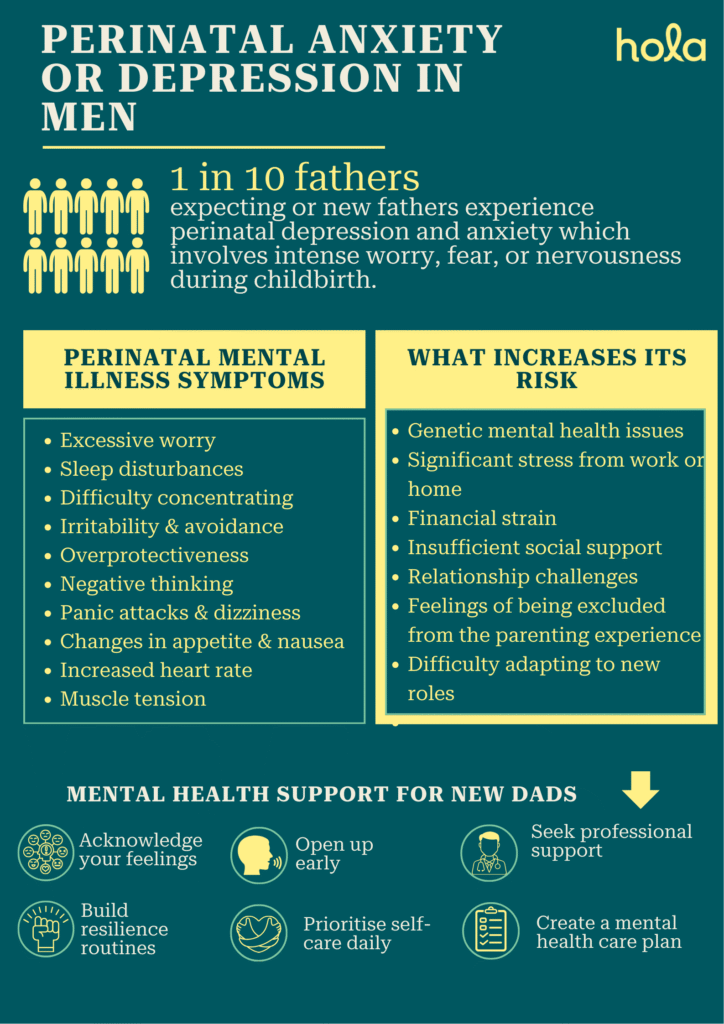Perinatal anxiety & perinatal depression in men: Therapist’s guide
Written by editorial staff writer at Hola. Medically reviewed by Amira Shah, MA in Counselling Psychology, Registered Psychotherapist.

Contents

Summary: Perinatal depression and anxiety aren’t exclusive to mothers; fathers can also experience these struggles. Therapists play a key role in understanding symptoms and providing assistance. By recognising the unique challenges fathers face during the perinatal phase, we can help guide men through this transition, promoting better mental health and stronger family dynamics.
Becoming a parent is a life-changing experience, and while much attention is often given to the mother’s mental health during pregnancy and the postpartum period, let’s not forget the dads! Reseach suggests Around 1 in 10 expecting or new fathers experience perinatal depression and anxiety. Perinatal anxiety and depression not only impact women; men can also find themselves navigating emotional highs and lows during this thrilling (and sometimes overwhelming) period. But here’s the catch: these conditions in men are often overlooked because they might not manifest in the “typical” manner. Men need to recognise, understand, and address their mental health issues. Let’s explore what’s happening in the minds of expectant or new fathers and how we can best support them through perinatal anxiety and depression.
What is perinatal anxiety?
Perinatal anxiety involves intense worry, fear, or nervousness during pregnancy or the first year after childbirth. It may appear as constant worry about the baby’s health, anxiety about shifting responsibilities, or relationships. Symptoms may include trouble sleeping, restlessness, irritability, and difficulty concentrating. While it is common to feel some level of stress during this time, perinatal anxiety becomes concerning when it disrupts daily life and overall well-being.Symptoms of perinatal anxiety
Symptoms of perinatal anxiety include:- Excessive worry
- Sleep disturbances
- Restlessness
- Difficulty concentrating
- Irritability
- Avoidance behaviours
- Overprotectiveness
- Negative thinking
- Panic attacks
- Changes in appetite
- Increased heart rate
- Dizziness
- Muscle tension
- Nausea
- Stomach problems
- Tightness in the chest
Also read: Perinatal depression: Symptoms, risks and treatment
What is perinatal depression?
Perinatal depression refers to depression that occurs during pregnancy or within the first year after childbirth. It involves persistent sadness, despair, or loss of interest. Symptoms may include irritability, fatigue, difficulty bonding with the baby, changes in appetite or sleep patterns, and feelings of guilt or lack of self-esteem. It may affect both mothers and fathers, though it is more commonly linked to women. Seeking help and professional care is vital for managing perinatal depression.
Symptoms of perinatal depression
Symptoms of perinatal depression include:
- Excessive worry
- Irritability
- Anger
- Unexplained aches
- Digestive issues
- Fatigue or low energy
- Changes in appetite
- Sleep disturbances
- Feelings of guilt or worthlessness
- Trouble concentrating
- Thoughts of self-harm
- Persistent sadness
- Difficulty bonding with the baby
- Feeling lonely
- Changes in sex drive
If these symptoms persist or interfere with daily life, it’s important to consult with a healthcare professional or therapist.
Take control of your mental health. Begin your care plan now.
What can increase a dad’s risk of developing perinatal mental illness
While discussions about perinatal mental health frequently centre around mothers, fathers can also face emotional difficulties during this period. Numerous factors may elevate a father's likelihood of experiencing perinatal mental illness, such as:- A personal or family history of mental health conditions (originally "issues")
- Significant stress from work or home
- Financial strain
- Insufficient social support
- Relationship challenges
- Feelings of being excluded from the parenting experience
- Difficulty adapting to new roles
Also read: Can men get postnatal depression? How to spot it?
Factors affecting paternal perinatal mental health
Although much attention during the perinatal phase is on mothers, fathers also undergo notable emotional and psychological changes. Grasping the factors that affect paternal mental health is crucial for delivering early assistance and nurturing healthy family dynamics.
- Emotional transition to fatherhood: The transition to parenthood can bring about excitement but also anxiety, self-doubt, and a sense of inadequacy. Managing the emotional demands of caring for a newborn can influence mental well-being.
- Changes in relationships: Stress or diminished intimacy with a partner, particularly when both are fatigued or overwhelmed, can amplify emotional strain. Additionally, if the mother is dealing with perinatal mental health challenges, it may further increase the father's vulnerability.
- Financial and occupational stress: Concerns regarding finances, job stability, or balancing work with parenting can create significant stress for new fathers, potentially leading to feelings of pressure and burnout.
- Lack of social support: Many fathers may feel excluded from postnatal support systems or unsupported by health professionals. Insufficient social or professional backing can intensify mental health struggles related to feelings of isolation.
- Personal or family mental health background: A previous experience of depression, anxiety, or trauma may emerge or worsen during the perinatal period. Early recognition and early intervention can help prevent further deterioration.
Factors that shape paternal perinatal mental health encompass emotional, relational, and environmental elements. Acknowledging and addressing these challenges can have a significant positive impact on a father's well-being and the overall health of the family unit.
Risk factors for paternal perinatal stress, anxiety and depression
Like mothers, fathers can face considerable psychological challenges during the perinatal phase. Though often overlooked, paternal stress, anxiety, and depression are valid experiences that can influence the family dynamic. Understanding the risk factors is crucial for early detection and support.
- Individual mental health background: A previous experience of depression, anxiety, or trauma raises the probability of encountering mental health challenges during the perinatal period.
- Sleep deprivation: Persistent lack of sleep due to nighttime parenting responsibilities can significantly affect mood and cognitive abilities, potentially leading to heightened stress and emotional exhaustion.
- Relationship struggles: Disagreements, ineffective communication, or feeling detached from a partner, especially during or following pregnancy, can elevate stress levels and the risk of depression.
- Financial strain: New financial obligations or concerns about job security can contribute to feelings of inadequacy, anxiety, and helplessness.
- Insufficient social support: Experiencing isolation or lacking close relationships with friends, family, or peers can worsen symptoms and make coping with stress more challenging.
- Partner's mental health challenges: If a partner is dealing with perinatal anxiety or depression, it increases the emotional load on the father and raises his own risk of developing similar issues.
Identifying these risk factors is essential for addressing paternal perinatal mental health. Early intervention, open dialogue, and access to suitable support can create a significant difference for both fathers and their families.

What to do
If you’re a new father feeling stressed, anxious, or down, it’s essential to realise that you’re not alone and there are resources available. Start by recognising your feelings and confiding in someone you trust, such as your partner, a friend, or a family member. Having open discussions can lighten the burden of what you’re experiencing. Pursuing professional assistance is a crucial step. A qualified therapist, general practitioner, or mental health expert can evaluate your situation and suggest an appropriate Mental Health Treatment Plan (MHTP). This plan may involve therapy sessions, medication if necessary, and access to resources like support groups or counselling. In certain areas, an MHTP might also make you eligible for subsidised mental health care services.
Engaging in simple daily activities exercise like sufficient sleep, nutritious eating, and time for yourself, can also enhance resilience. Seeking help early can significantly impact your well-being and your role as a father.
Supporting fathers through perinatal anxiety and depression is just as important as supporting mothers. By identifying the symptoms and offering the right tools and empathy, we can help new dads navigate this challenging time with confidence. After all, mental health is important for everyone in the family, because a happy dad means a happy family!
Ready for positive change? Start your mental health care plan here.
What we treat
- Cough
- Nausea & vomiting
- Fever
- Hayfever
- Fatigue
- Sore throat
- Acne
- Hair loss
- Gout
- Eczema
- Rosacea
- Sunburn
- UTI
- Erectile dysfunction
- Contraception
- Morning sickness
- Morning after pill
- Prostate health
- Anxiety
- Depression
- Stress
- Grief & loss
- Antidepressants
- Premature ejaculation
- Asthma
- Blood pressure
- Blood thinners
- Diabetes
- Cholesterol
- Migraines & headaches
- Allergies
- Body ache
- Heartburn & reflux
- Sleep disorder
- Pain relief
- Gastro
Related Articles
Disclaimer
This blog is for general informational purposes only and does not indicate that Hola Health provides all treatments or preventive measures mentioned. It is not intended to be a substitute for professional medical advice. Always seek the guidance of your doctor or other qualified health professional with any questions you may have regarding your health or a medical condition. For emergencies please immediately contact 000. Any medical topics discussed are intended to educate, not to imply availability through Hola Health.

Get affordable healthcare on your terms, with quick access to qualified, Australian-registered telehealth doctors & health practitioners, 24/7, 365 days a year. No more searching for ‘doctors near me‘ – Hola connects you instantly.
Address: 79 St Georges Terrace, Perth WA 6000


Hola Health App
Get affordable healthcare on your terms, with quick access to qualified, Australian-registered telehealth doctors & health practitioners, 24/7, 365 days a year. No more searching for ‘doctors near me‘ – Hola connects you instantly.
Call 000 for emergency or urgent medical help.
Address: 79 St Georges Terrace, Perth WA 6000
© Hola Health, a brand of Packapill Pvt Ltd


 Facebook
Facebook  X
X  Copy Link
Copy Link












